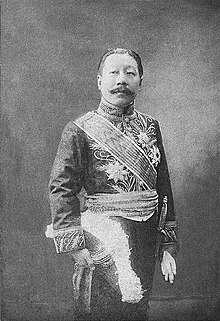Hu Weide
| Hu Weide 胡惟德 |
|
|---|---|
 |
|
| President of the Republic of China (Acting) | |
|
In office 20 April 1926 – 13 May 1926 |
|
| Preceded by | Duan Qirui |
| Succeeded by | Yan Huiqing |
| Personal details | |
| Born | 1863 |
| Died | 24 November 1933 |
| Nationality | Republic of China |
| Political party | Non-partisan |
Hu Weide (Chinese: 胡惟德; pinyin: Hú Wéidé; Wade–Giles: Hu Wei-te) (1863 – 24 November 1933) was a Chinese politician and diplomat during the Qing dynasty and the Republic of China.
Though related by marriage to the Qing, he accepted the republic and served in its foreign ministry, having previously been the Vice Minister of Foreign Affairs in the Qing Dynasty as a member of Yuan Shikai's Cabinet. He served as ambassador to Russia, Japan, and France and was a rival of Wu Tingfang. He was also a judge of the Permanent Court of International Justice.
After Duan Qirui was ousted from Beijing in 1926, Hu served briefly as acting president and premier.
Hú Wéidé's political career is unique in that his career did not end with the passing of power from one form of government to another. He was a prominent politician and diplomat in the late Qing Dynasty as well as the early Republic of China. His role in the Chinese diplomacy history is immense, although he is also considered by many as being responsible for the feeble diplomacy practiced by China. Wéidé was truly one of the first Chinese politician with a strong grasp of global affairs. He graduated from the Shanghai Interpreters College. His proficiency in English, French and Russian allowed him to pursue the study of these countries, which made him a specialist in these nations.
...
Wikipedia
